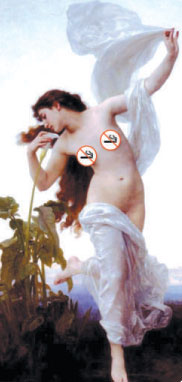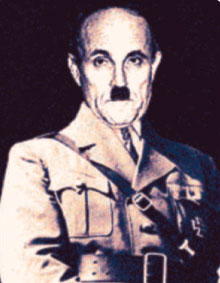|
There’s an old Abbot and Costello routine. Abbot  spends the last of their money on a hamburger, leaving Costello with a magazine page on which there is a picture of a steak. As Costello drools at the hamburger that Abbot is eating, Abbot explains that it’s all mind over matter. He tells Costello to eat the magazine page. Costello hesitantly brings the page to his mouth. Abbot encourages him, complaining that all he himself has to eat is a lousy hamburger while Costello has a big beautiful steak. Costello chews the page and swallows. spends the last of their money on a hamburger, leaving Costello with a magazine page on which there is a picture of a steak. As Costello drools at the hamburger that Abbot is eating, Abbot explains that it’s all mind over matter. He tells Costello to eat the magazine page. Costello hesitantly brings the page to his mouth. Abbot encourages him, complaining that all he himself has to eat is a lousy hamburger while Costello has a big beautiful steak. Costello chews the page and swallows.
We’ve all become Costello. We eat the illusion as we starve. We eat and evacuate "freedom" and "liberty," "compassion" and "justice"—the words, not the real things. But unlike Costello, we’ve come to enjoy our meal. We’ve been conditioned to consume it with a pleasant and politically correct smile. It’s become only blandness our systems can take. And the more that empty words take the place of things—the more they come not to denote but to supplant—the more that we must distinguish between "good" words and "bad." Not according to poetic or linguistic standards, but rather to "moral" standards.
As words become the closest we come to things themselves, "good" words are to be the whole of our babblement while "bad" words are forbidden, criminally punished, expelled from society. To have "family values" is good, but we must ensure that no child is brought into a family through "fucking." Through the advances of modern verbal science, we do not have a single "cripple" or "retard" among us. We do, however, have "challenged" persons. Like "used cars," they were here one day, replaced by  "pre-owned vehicles" the next. Challenged by whom? I myself was taught never to pick on them. "pre-owned vehicles" the next. Challenged by whom? I myself was taught never to pick on them.
When Hitler banned smoking in Nazi Germany in the spring of 1939 it was "bad." When the late, great mayor of New York banned smoking sixty-four years later, almost to the very day, in the spring of 2003, it was "good." This is because Hitler was "bad" and the mayor, because he was not Hitler, was "good." And it’s because the science behind Hitler’s ban—the Institute for Tobacco Hazards Research (Das Wissenschaftliches Institut zur Erforschung der Tabakgefahren)—was "bad," and the science behind the mayor’s ban—the World Health Organization, the bastion of the post-war anti-smoking movement—was "good."
It was the World Health Organization that warned us in 1955 that: "Under the influence of cannabis, the danger of committing unpremeditated murder is very great; it can happen in cold blood, without any reason or motive, unexpectedly, without any preceding quarrel; often the murderer does not even know the victim, and kills simply for pleasure." Surely the World Health Organization must be right, even if the results of its own ten-year study on the effects of what it called ETS (Environmental Tobacco Smoke)—results that were not much publicized—failed to show a connection between secondary smoke and disease. There probably was no proof either of the connection between marijuana-smoking and murder, but surely none will be so foolhardy as to call it myth. Besides, the World Health Organization was always taking out its United Nations wallet and showing everybody all those sad pictures of starving children. Sad pictures of starving children are "good." We should give them all pictures of steaks to eat. But even then, we must see to it that their health is protected from the dangers of exposure to tertiary smoke, which is what happens when you’re around somebody who’s been exposed to secondary smoke. And even then, the risk of random homicide at the hands of lurking marijuana-smokers must not be discounted. If we protect the starving children from these things—it will only cost us pennies a week—we will be "good." Or we could feed them Power Bars instead of pictures, although this would increase the cost to us by several pennies.
Power Bars are "good" because they are nutritious, more so even than a picture of a steak. Their main ingredient is fructose syrup. Fructose syrup is "good," because we should eat all the sugar we can. Remember: smoke "bad," sugar "good." And Power Bars were invented by a nice man who was married to a nutritionist. And he did not smoke, and she did not blow secondary smoke at him or run up a bag of reefer and dismember him. They were "good." And he got rich selling sugar to people and that is "good." But now he is dead, and that is "bad." He was only fifty-one years old when he croaked, and that is really "bad." I know junkies a lot older than he was. Maybe he did not eat enough Power Bars. Or maybe, a long time ago, he was in a room with an ashtray. To feel sympathy for the nutritionist lady is "good." Now she has enough money to give Power Bars to everybody. We want sugar, lady, we want sugar. Mmm. But maybe croaking at fifty-one is not such good publicity for the healthy way of life. Maybe I should market my Duji Wuji Bars: fructose syrup and heroin. Mmm, mmm, good. I want heroin, lady, I want heroin.
It is "bad" to want to place your penis into the mouth of a widow and say "Here, ma’am, suck on this Power Bar awhile." Even to say it or just to think it would be "bad." Our "freedom" is very precious: if you say dirty things around it, or think nasty thoughts around it, it will die. And that would be "bad." Worse even than when the Power Bar man died. You are "bad"—very "bad"—for reading this. You will surely go to Hell when you eat your final Power Bar. And you know what’s there, don’t you? Yes: Environmental smoke.
One of our "great men" was a man named Rudolph Giuliani. He did not invent the Power Bar, but still he was "great." When he was the mayor of New York he brought "quality of life" to New York, and, of course, "quality of life" is "good." He did this by outlawing topless bars, which are "bad." Yes, even as a devout Roman Catholic, he had the "courage" to take a stand against God, who surely had done a very "bad" thing when he let Eve traipse around with those things of hers jiggling around. So the "great man" named Rudolph Giuliani made ladies’ titties illegal. He was a "brave" man. He was "challenged," yes—so homely that no good-looking woman would give him a good look—but he "overcame" this "challenge." He did this through "just retribution," by casting titties from the garden of the quality of life. But that is not why he was a "great man." He became a "great" man during a "time of great tragedy," when he put on a baseball cap. And because of this, there were many opportunities to grow rich in positions that never would have been offered him if there had been no "time of great tragedy," for a "time of great tragedy" makes "heroes" of men. And though he was, as "heroes" often are, too humble to say it, we can all be assured that, devout Christian that he was, the late, great Rudolph Giuliani got down on his hands and knees every night before he went to bed and thanked God for the "tragedy" that redeemed, raised, and enriched him.
I was in a jail cell one night before the "time of great tragedy." I now can see that God had placed me there, to minister to those whose souls had strayed. I had the matches, and they had none. A jail cell is a "bad" place. Written on the walls are all manner of vile obscenity and grammatical error. But in this cell, in the heart of New York, there was no obscenity, but only, again and again in a myriad of colors, sizes, and shapes, the phrases "KILL RUDY" and "DIE RUDY DIE." The poor man was considered to be a disgrace not only to the wops but to races that could brag that they had never even produced one among them such as he.
But when the "time of great tragedy" came, all men cast their writing implements aside as there rose among them a cry of "Hail, Rudy, hail!" Embraced then they the "quality of life." Scorned then they the female breast. Out with those cigarettes! Off with those breasts! It was time to fight for "freedom." Let all men hide the truth of themselves within them, and let all men speak only the "truth." And then, when the great attorney general of the United States of America stood before the statue known as the Spirit of Justice in the Great Hall of the United States Department of Justice—lo and behold—the Spirit of Justice, which had stood there with one breast exposed since the 1930’s, had been draped with blue cloth to cover her shame. And it was "good." And then at the Superbowl, in which the Panthers beat the spread, a fair-skinned Negress teat was exposed by a pale white faggot accomplice, and there was much wrath and wailing and fear of justice and begging for mercy in the land. And it was good. And wasn’t it a shame the way those awful wogs made women cover themselves with those babushkas and veils or whatever the hell they called them. I tell you, if I were a gal these days, I would watch out for that Resolute Sword.
"Unser führer Adolf Hitler trinkt keinen Alkohol und raucht auch nicht"—"Our führer Adolf Hitler drinks no alcohol and does not smoke"—said the inspirational words beneath the picture in Auf der Wacht in 1937. As it said on the cover of the Hitler Youth manual, "Du hast die Pflicht gesund zu sein!" You have the duty to be healthy!
|





